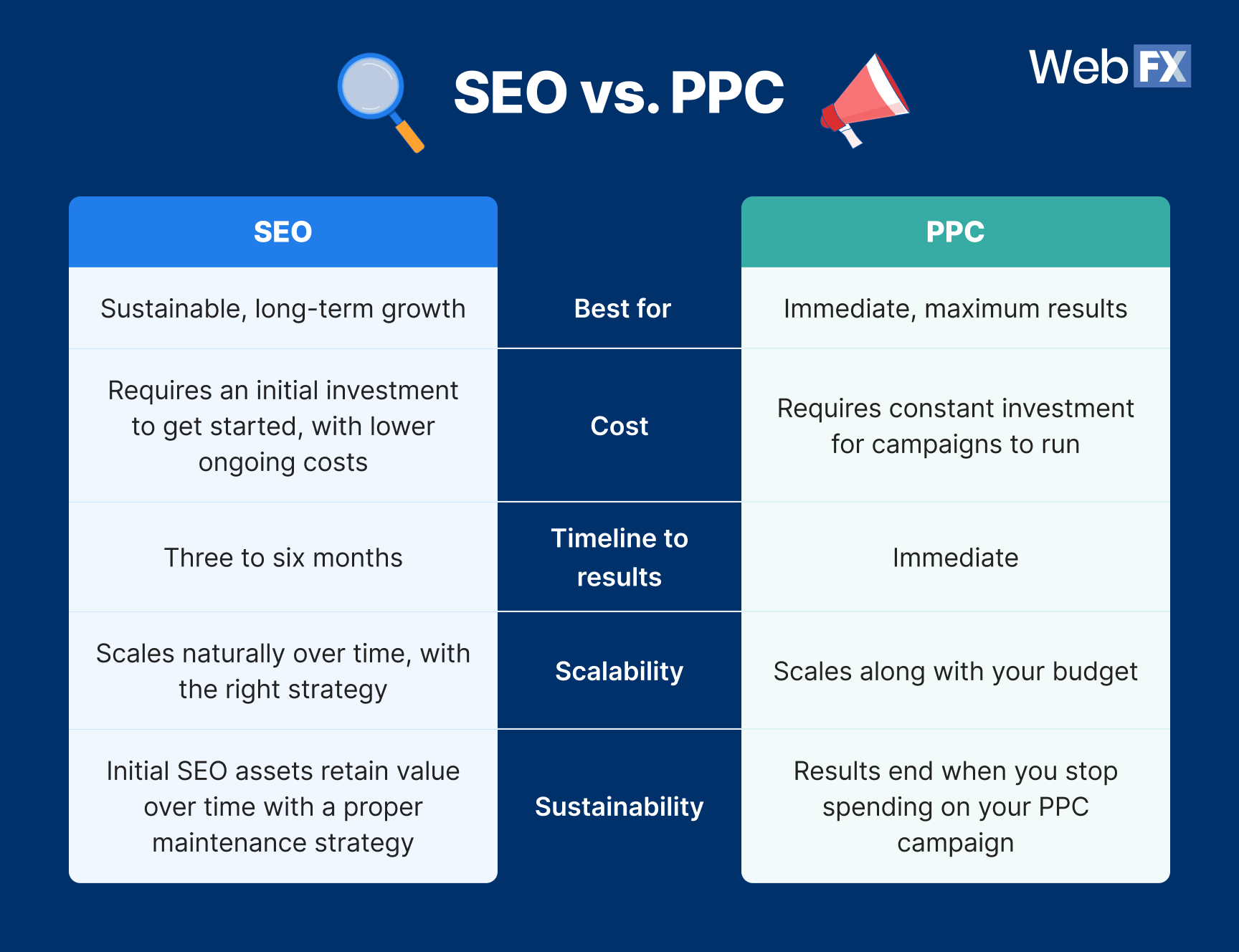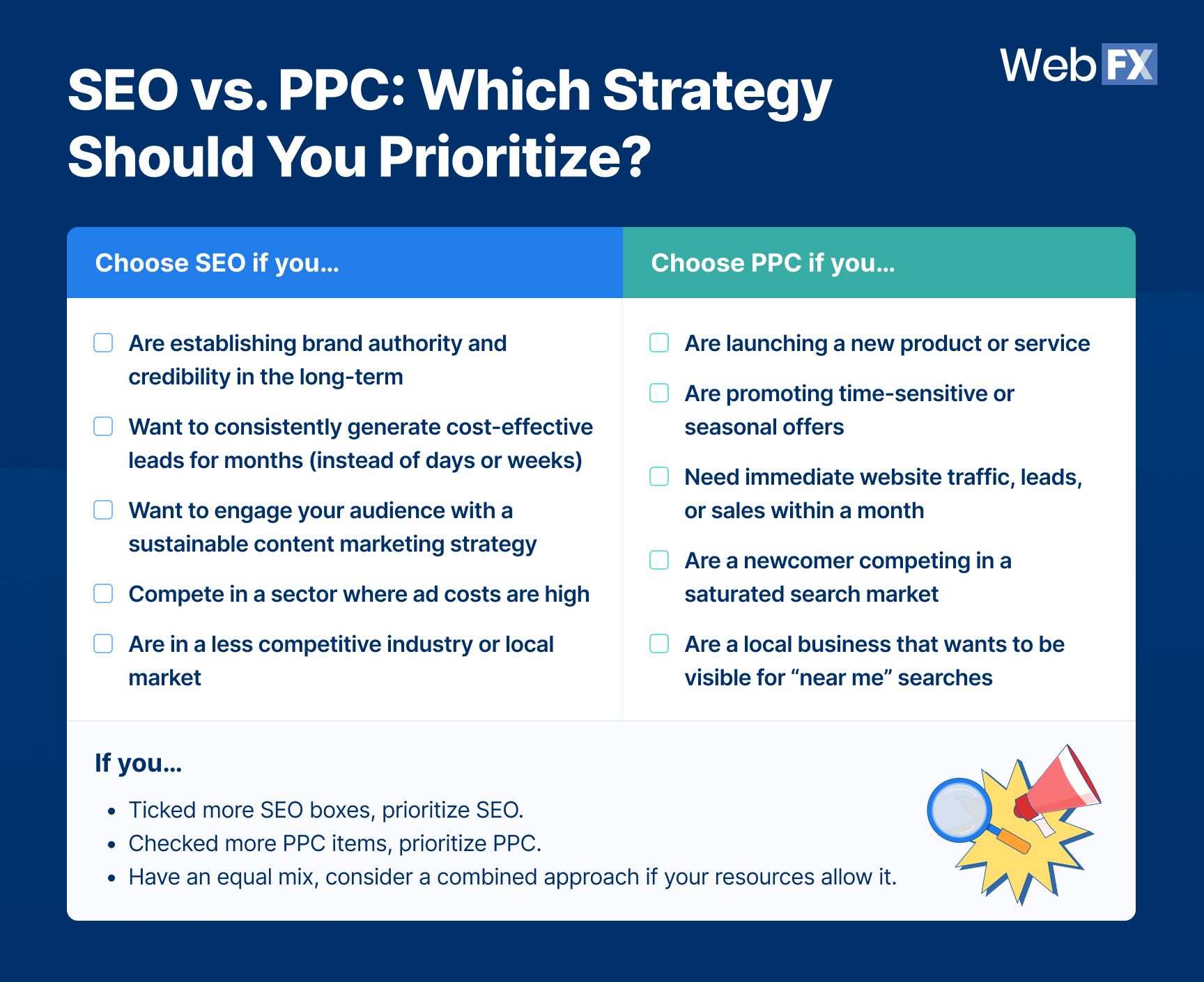-
 Published: Sep 19, 2025
Published: Sep 19, 2025
-
 11 min. read
11 min. read
-
Summarize in ChatGPT
-
 Jessica Bonacci
Jessica Bonacci Lead Multimedia Consultant
Lead Multimedia Consultant
- Jessica Bonacci is a Lead Multimedia Consultant at WebFX, where she produces engaging digital content and manages the WebFX video and social media strategies. Jess has created hundreds of videos and social media posts for the WebFX brand aimed at educating fellow marketers and business owners, even creating content for WebFX partner brands like SEO.com and Nutshell. She’s covered everything from the marketing basics to complex technologies that drive business growth. With a B.A. in Digital Media and Broadcast Production, Jess is always putting her creativity and production skills to work with exciting new multimedia projects. When she’s not looking for new ways to engage with WebFX fans, Jess is usually reading a good book, traveling, or volunteering in the community.
-
What is the main difference between SEO and PPC?
SEO is a long-term strategy that optimizes your website to appear in organic search results for free, while PPC is a paid advertising strategy that delivers immediate visibility by placing ads at the top of search results for a cost per click. -
When should a business prioritize SEO over PPC?
Businesses should focus on SEO when building long-term brand authority, competing in industries with high ad costs, operating in less competitive local markets, or seeking sustainable lead generation through cost-effective content marketing efforts. -
When is PPC the better choice for businesses?
PPC is ideal for launching new products or services, promoting time-sensitive or seasonal offers, needing immediate traffic and sales within a month, or competing as a newcomer in a saturated market against established competitors. -
What are the key benefits of combining SEO and PPC?
A blended strategy provides sustainable organic traffic with PPC as backup during algorithm changes, allows businesses to gather conversion insights from PPC to inform SEO efforts, and creates more opportunities for audience nurturing and retargeting. -
How can businesses integrate SEO and PPC effectively?
Companies can promote organic content with PPC ads, analyze PPC campaign data to fuel SEO strategy, retarget organic site visitors with PPC campaigns, and publish organic content related to competitors’ PPC keywords for comprehensive market coverage.
SEO, or search engine optimization, allows you to build long-term visibility for your website on search engines through ongoing optimizations, while PPC, or pay-per-click) allows you to get immediate visibility in search results through paid advertisements.
Keep reading to learn more about the differences between SEO vs. PPC! Here’s a quick overview of what we’ll cover:
- SEO vs. PPC: What’s the Difference?
- When to use SEO vs. PPC
- What is SEO?
- What is PPC?
- The power of two: Combining SEO and PPC
- FAQs
SEO vs. PPC: What’s the difference?
Search engine optimization (SEO) is a strategy that involves optimizing your website to help it appear in more organic, unpaid search engine results.
Pay-per-click (PPC) advertising is a strategy that involves paying for advertisements that appear at the top of the search engine results and other websites.
While SEO and PPC both play key roles in growing your business, you may need to prioritize one over the other, depending on your goals, resources, and the industry or competitive landscape.
For a quick breakdown of SEO vs. PPC, you can refer to this infographic:

Table view 🔽
| SEO | PPC | |
| Best for | Sustainable, long-term growth | Immediate, maximum results |
| Cost | Requires an initial investment to get started, with lower ongoing costs | Requires constant investment for campaigns to run |
| Timeline to results | Three to six months | Immediate |
| Scalability | Scales naturally over time, with the right strategy | Scales along with your budget |
| Sustainability | Initial SEO assets retain value over time with a proper maintenance strategy | Results end when you stop spending on your PPC campaign |
When to use SEO vs. PPC
While the ideal strategy is integrating both SEO and PPC, every organization’s specific situation, goals, and resources are unique. Your current situation and priorities may call for either an SEO-first or PPC-first approach.
Not quite sure which channel to choose? Let our checklist guide you.
Check all the items that apply to your current situation. If you ticked more SEO boxes, prioritize SEO.
Got more PPC items checked? Focus your efforts on PPC first. If you have an equal mix, consider a combined approach if your resources allow it.

Table view 🔽
Choose SEO if you…
Choose PPC if you…
What is SEO?
SEO is the process of getting traffic from the “free” or “natural” listings on search engines, such as Google or Bing.
SEO is like a marathon, where it takes a lot of time to see the results of your hard work. Your website is modified or improved to help it appear higher in the organic listings.
The pros of SEO
Here are the advantages of SEO for your business:
- SEO is free: While this strategy still comes with an initial investment cost, SEO is technically free. You don’t need to spend to drive users to your site — they organically discover your page when they search online.
- SEO delivers long-term benefits: Once all the SEO best practices are implemented — like creating quality content — the results will outlast your efforts. The ROI for SEO will continue to climb long after PPC has peaked. That means your site will continue attracting customers indefinitely.
- SEO drives relevant, targeted traffic: SEO allows for the use of long-tail keywords, which are three to five-word phrases that refine a search term to be more targeted. With long-tail keywords comes more relevant traffic.
- SEO encourages a user-friendly website: With advanced SEO, you earn visitors by constantly optimizing your site to improve your content and the user experience. It may take a lot of work, but it’s a good thing in the long run.
The cons of SEO
SEO is an excellent strategy, but it does have its own disadvantages. Here are its cons:
- SEO faces ever-changing Google algorithms: A top complaint about SEO is that all the optimization work you put into your site could be affected completely when Google releases new algorithm changes (which they do, at a rate of about 1.2 changes per day).
- SEO requires ongoing maintenance: Keyword research, content updates, link building, and more are all factors of SEO that need to be regularly monitored and updated for your site to maintain rankings or to increase them.
- Results from SEO take time: Compared to the instantaneous results of PPC, when you’re comparing SEO vs. PPC, the time lag with SEO can be a downfall. It can take anywhere from three to six months to see an increase in rankings or traffic. This also depends on how much optimization is needed for your site to even be ready to launch.
When you must prioritize SEO
Given the benefits and limitations of SEO, this digital marketing channel is an excellent choice if:
- You are building your brand authority and credibility in the long run: SEO involves creating helpful content, which helps you rank in search engine results pages (SERPs) and establish your authority in your niche. As your audience sees more of your pages appear in their searches, they’ll see you as a credible source and business they can trust.
- You want to consistently generate cost-effective leads over time: While SEO may not give you instant results like increased site visits and leads overnight, it can drive steady growth. You’ll eventually see the site visits grow and your leads consistently come in.
- You want to engage your audience with a sustainable content marketing strategy: SEO is an excellent strategy to nurture your relationships with your prospects. Engage them with various types of content — from blog posts and original research to interactive content like calculators and checklists.
- You want to compete in a sector where ad costs are high: If ad costs in your industry are beyond your budget and extremely high because of the competition, you can implement SEO instead. Results from SEO may take time, but they compound over time as you continue your cost-effective SEO efforts.
- You are in a less competitive industry or local market: Because the search volume is typically low for these sectors, it’s easier to rank for relevant search queries, making SEO the more cost-effective and sustainable option.
What is PPC?
PPC advertising allows you to display ads in the sponsored results section of a search engine’s results page. When that ad is clicked, you are charged a fee.
If you want immediate clicks to your website, PPC is a much shorter race — more like a short sprint — because you can immediately start appearing on the first page of results.
The pros of PPC
Here are the benefits of using PPC:
- PPC offers maximum visibility in search results: PPC ads are typically placed above the regular search results, so users will see you before your competitors. With PPC, you don’t have to wait for months to get a prominent spot in SERPs.
- PPC delivers immediate results: If you are first launching a website or even a brand-new company, you want to get your new site or name out there as soon as possible. PPC works a lot faster in the short race of SEO vs. PPC. It is also beneficial if you have special promotions or events that need exposure and cannot be planned months in advance.
- PPC offers complete control: With PPC ads, you have control over which page the “clicker” is sent to. By having control over the landing page, you ensure that the visitor sees the most relevant information to what your ad was displaying.
- PPC provides flexibility: You can choose which keywords you want to bid higher on, how much you want to spend in a day, and even pause your campaign if you are running low on your budget. You can also set the placement of your ads and the location where you want your ad to be shown.
The cons of PPC
PPC comes with some drawbacks, too. Here they are:
- PPC requires constant investment: Once the money stops, the ads stop. While you may gain some branded traffic down the road, that unbranded search traffic will completely disappear when the ads stop running.
- PPC costs add up: Even though you can control your PPC campaign budget, costs can pile up and you may end up spending more money than you originally planned. Traffic to your site with PPC completely depends on the money you pour into it. If the keywords you are targeting become highly competitive, they may become expensive and can drain your budget quickly.
- PPC comes with a learning curve: PPC is difficult for a lot of businesses to start because platforms like Google Ads are somewhat complicated. It takes a lot of research and practice to nail down a practical PPC campaign for any business, especially when you’re brand new to it.
When you must prioritize PPC
Now that you know its advantages and disadvantages, let’s dive into when it’s best to prioritize PPC over SEO:
- You’re launching a new product or service: For maximum impact, you can prioritize your PPC efforts when you’re introducing a new product or service. That way, you can immediately drive qualified traffic to your site and generate leads!
- You’re promoting time-sensitive or seasonal offers: Run PPC campaigns when you need to promote limited-time offers to generate traffic and leads within your promotion period.
- You need immediate site traffic, leads, or sales within a month: Businesses may need instant visibility or sales for various reasons, such as events, cash flow emergencies, crisis management, or market competition. PPC can come in handy to drive their desired traffic and new sales.
- You’re a newcomer competing in a saturated market: If you’re a new industry player competing against established brand names with years of SEO authority, ranking organically will be an uphill climb. Use PPC to accelerate your growth. PPC lets your brand appear alongside these competitors in the search results.
- You’re a local business that wants to be visible for “near me” searches: Local searches typically show map results and ads on top of organic results. If you want your business to get a prominent spot on these local search results, run PPC campaigns for relevant local searches.
The power of two: Combining SEO and PPC
SEO and PPC both offer unique advantages to your business. Combining these strategies lets you create a sustainable, long-term strategy for growth while capturing immediate leads and sales.
3 benefits of a blended SEO and PPC strategy
Once your budget and time resources allow, consider blending both strategies to reap these benefits:
- Sustainability of organic search and the backup of PPC: SEO provides a steady flow of traffic and leads to your site, while PPC acts like your backup stream when your traffic fluctuates due to algorithm changes.
- Gathering insights from PPC to inform your SEO strategy: When you run PPC campaigns, you get insights on which keywords and messages effectively convert your audience. Use these insights to improve your SEO strategies.
- Effective nurturing and retargeting: When combining SEO and PPC, you’re improving your conversion opportunities. Together, they create more opportunities for you to reach your audience and nurture them. PPC is also an excellent strategy to retarget users who’ve previously engaged with your site.
4 ways to integrate SEO and PPC
SEO and PPC can coexist in your strategy. Here are some ways you can integrate these two:
- Promote organic content with PPC: Use PPC to boost your organic content’s reach. You don’t have to promote every blog post. Choose key pages that your audience will really find helpful, like original research or a page with a downloadable guide.
- Analyze your PPC campaign’s data to fuel your SEO strategy: Use your PPC campaign data to understand how your audience engaged with the page and your site and whether they converted. Use these insights to inform your SEO strategy.
- Retarget your organic site visitors with PPC: Deliver ads to users who’ve previously interacted with your website. Retarget audiences who’ve visited certain pages or followed a sequence of visiting a product page and then lead form. It’s an excellent way to re-engage and nurture them into conversion.
- Publish organic content related to your competitor’s PPC keywords: Your competitors are likely running PPC campaigns on their most important searches. You can also run ads for these terms, but you can also create organic content.
FAQs
Let’s answer your other SEO vs. PPC questions here:
When should I use both SEO and PPC?
Use SEO and PPC when you want to maximize your visibility in the SERPs and you have allocated budget and resources for both efforts.
Scenarios like a new product launch call for the combined strategy of SEO and PPC. You want SEO to build sustainable growth and consistently generate high-quality leads while PPC immediately drives qualified traffic and leads.
🎥 Video: Learn Organic vs. Paid Marketing
When should I prioritize SEO over PPC?
Prioritize SEO when you want to focus on long-term, sustainable growth. Focus on SEO if:
- You’re establishing your brand authority and credibility in the long run.
- You want to consistently generate cost-effective leads over time.
- You want to engage your customers with content marketing.
- You compete in an industry where ad costs are high.
- You’re in a less competitive local market.
When should I choose PPC over SEO?
In some instances, your business could use a boost from paid ads. Prioritize PPC if:
- You’re launching a new product or service
- You’re promoting time-sensitive or seasonal offers.
- You need immediate website traffic, leads, or sales.
- You’re a new industry player competing in a highly competitive market.
- You’re a local business trying to appear in “near me” searches.
What is search engine advertising?
Search engine advertising is the use of SEO and PPC to promote your business in search engines.
How can PPC provide immediate visibility for my business?
While your ad’s exact placement depends on your ad score (a metric that considers bid amount, ad quality, and relevance), expect to see it in prominent positions of the SERPs after launching your campaigns. Your ad may not immediately appear in the top spot, but it’ll still be placed above the organic results.
What are the hidden costs of SEO and PPC?
When you decide to implement SEO or PPC, factor in other costs.
For SEO, here’s a list:
- Freelancer or agency fees for content creation, optimization, and ongoing maintenance
- Tools and software for your analytics and performance monitor
- Hosting or server upgrades to optimize for technical SEO
For PPC, mind the following:
- Agency or freelancer campaign management fees
- Fees for landing page creation and optimization
- Tools for analytics (to test ads and measure conversions)
- Higher ad budget during peak competitive season
Can small businesses with limited marketing budgets afford to do both SEO and PPC?
Yes, small businesses with limited budgets can implement both SEO and PPC with a scaled approach.
However, they need to initially focus on one strategy based on their most pressing needs. Then, they can gradually integrate the other strategy as their resources permit and based on their results.
Beyond SEO vs. PPC: Your next steps toward bottom-line growth
You can benefit from implementing both SEO and PPC strategies, instead of picking one over the other.
SEO is a long-term strategy that helps you establish your brand authority. It’s a sustainable way to engage with your audience and generate leads.
On the other hand, PPC offers maximum visibility and delivers immediate results. If you’re launching a new product or competing in a highly saturated market, PPC is an excellent strategy to stand out and get instant results.
If you want to maximize results from both strategies, consider partnering with experts. WebFX is a full-service digital marketing agency that offers SEO and PPC, along with other services.
We’ve driven over 1,312,500 page 1 rankings on Google for our clients and generated $28M in revenue for our clients through their PPC campaigns.
Let’s work together so you can grow your bottom line through SEO and PPC. Call us at 888-601-5359 or contact us online to speak with a strategist about how you can get a tailored SEO and PPC strategy for your company!
-
 Jessica Bonacci is a Lead Multimedia Consultant at WebFX, where she produces engaging digital content and manages the WebFX video and social media strategies. Jess has created hundreds of videos and social media posts for the WebFX brand aimed at educating fellow marketers and business owners, even creating content for WebFX partner brands like SEO.com and Nutshell. She’s covered everything from the marketing basics to complex technologies that drive business growth. With a B.A. in Digital Media and Broadcast Production, Jess is always putting her creativity and production skills to work with exciting new multimedia projects. When she’s not looking for new ways to engage with WebFX fans, Jess is usually reading a good book, traveling, or volunteering in the community.
Jessica Bonacci is a Lead Multimedia Consultant at WebFX, where she produces engaging digital content and manages the WebFX video and social media strategies. Jess has created hundreds of videos and social media posts for the WebFX brand aimed at educating fellow marketers and business owners, even creating content for WebFX partner brands like SEO.com and Nutshell. She’s covered everything from the marketing basics to complex technologies that drive business growth. With a B.A. in Digital Media and Broadcast Production, Jess is always putting her creativity and production skills to work with exciting new multimedia projects. When she’s not looking for new ways to engage with WebFX fans, Jess is usually reading a good book, traveling, or volunteering in the community. -

WebFX is a full-service marketing agency with 1,100+ client reviews and a 4.9-star rating on Clutch! Find out how our expert team and revenue-accelerating tech can drive results for you! Learn more
Try our free Marketing Calculator
Craft a tailored online marketing strategy! Utilize our free Internet marketing calculator for a custom plan based on your location, reach, timeframe, and budget.
Plan Your Marketing Budget

SEO Success with KOA

Proven Marketing Strategies
Try our free Marketing Calculator
Craft a tailored online marketing strategy! Utilize our free Internet marketing calculator for a custom plan based on your location, reach, timeframe, and budget.
Plan Your Marketing Budget
What to read next




